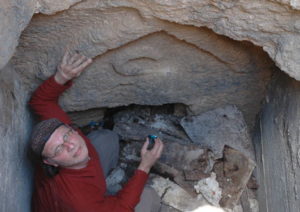Newsflash: Behind Many Academic Titles are Theological agendas!
 In the past, I had pointed out that many of the professors attacking our findings e.g., the Talpiot tomb, or the Jonah inscription, are not working for institutions where academic freedom is the keyword. Rather, they are working for theologically driven institutions and their job is to promote specific theological agendas. In other words, behind the academic title is a theological agenda. One of our critics has been Prof. Christopher Rollston who teaches at Emmanuel Christian Seminary. Recently, Prof. Rollston wrote an opinion article for the Huffington Post talking about women and the bible. The Seminary didn’t like it and this tenured professor is now being asked to look for a job elsewhere. I rest my case. See below:
In the past, I had pointed out that many of the professors attacking our findings e.g., the Talpiot tomb, or the Jonah inscription, are not working for institutions where academic freedom is the keyword. Rather, they are working for theologically driven institutions and their job is to promote specific theological agendas. In other words, behind the academic title is a theological agenda. One of our critics has been Prof. Christopher Rollston who teaches at Emmanuel Christian Seminary. Recently, Prof. Rollston wrote an opinion article for the Huffington Post talking about women and the bible. The Seminary didn’t like it and this tenured professor is now being asked to look for a job elsewhere. I rest my case. See below:
From http://www.insidehighered.com/news/2012/10/15/seminary-threatens-discipline-professor-offending-prospective-students-donors”>insidehighered.com
[See also paleojudaica.blogspot.co.uk]
===================================================================
Tenure vs. Donors
October 15, 2012 – 3:00am
By Libby A. NelsonThe president of a Tennessee seminary told a tenured professor that
his views were offending prospective students and possible donors and
that he should look for work elsewhere.The trouble began when Christopher Rollston, a professor of Old
Testament and Semitic Studies at Emmanuel Christian Seminary, a
graduate seminary affiliated with the Restoration Movement, wrote an
opinion article for The Huffington Post’s religion section about the
marginal status of women in the Bible. “To embrace the dominant
biblical view of women would be to embrace the marginalization of
women,” Rollston wrote. “And sacralizing patriarchy is just wrong.”The article led to a very public disagreement with another member of
Emmanuel’s faculty and a letter of rebuke from the seminary’s
president, Michael Sweeney, who issued a less-than-veiled threat to
Rollston: stop taking liberal positions that alienate donors and
prospective students, or find another place to work.Rollston has tenure, but Emmanuel professors can be dismissed for
cause if they exhibit “behavior demonstrating that [they are] no
longer in sympathy with the purposes and goals of the school,”
according to the seminary’s faculty handbook. In an undated letter to
Rollston, forwarded to Inside Higher Ed by a person who does not work
at Emmanuel, Sweeney writes that the professor’s teaching style and
the effect he
has on his students “have demonstrably exacerbated our
current financial problems. That, along with your recent blog, puts
you at odds with the purpose and goals of the school… If you feel
that you are unwilling or unable to change any of this, and, frankly,
I am not even sure it is possible for you to do so at this stage, I
strongly suggest you increase your efforts at finding a position in a
university where people are not studying for the ministry.”Sweeney said that Rollston needed to address “several matters” of
concern to administrators and the board of trustees. Among those
matters was a bullet point labeled “donor issues”: Rollston’s
reputation, Sweeney wrote, was scaring off prospective donors.“At a time when Emmanuel is under severe financial stress, we have
some potentially significant donors (one of whom is capable of regular
gifts in the six-figure range) who refuse to support Emmanuel because
they regard your influence as detrimental to students,” Sweeney wrote.In the letter, Sweeney accused Rollston of causing crises of faith
among his students, saying that he usually discounted such claims
because many students come from a conservative background and are not
used to having their beliefs challenged. But the number of reports
troubled him, he wrote, and those issues had not arisen with
Rollston’s predecessors.The professor’s reputation was also making recruitment more difficult
at local Bible colleges, Sweeney went on to say, adding that his work
at The Huffington Post elsewhere was damaging Emmanuel’s “brand
identity.”“Of course, low enrollment is a major problem we are all dealing with
as an institution and we would hope to be able to regard all of our
faculty members as assets in turning this around instead of
liabilities,” Sweeney wrote.Sweeney declined to comment because “at this stage no decisions have
been made and we are handling things through our protocols,” he wrote
in an e-mail to Inside Higher Ed. Both Sweeney and Rollston’s lawyer,
Stephen Rush, to whom Rollston referred all questions, said that the
professor is still employed and tenured at Emmanuel, although
disciplinary proceedings are ongoing.The dispute is getting attention at several blogs that deal with
religion and academe. Several professors of religion at other
institutions, as well as Emmanuel alumni, have questioned Emmanuel’s
commitment to academic freedom for seemingly threatening to fire a
tenured professor for financial reasons.“Is the institution really contemplating disciplining Dr. Rollston for
publishing a popular essay that simply presents some uncontroversial
points about how women are viewed in the Bible and how this clashes
with the values of our society?” one typical example reads at
PaleoJudaica, the blog of Jim Davila, a professor of divinity at the
University of St. Andrews, in Scotland. “There have obviously been
some mistakes made, and there is the danger of these reflecting badly
on Emmanuel Christian Seminary.”
To read more click here.

